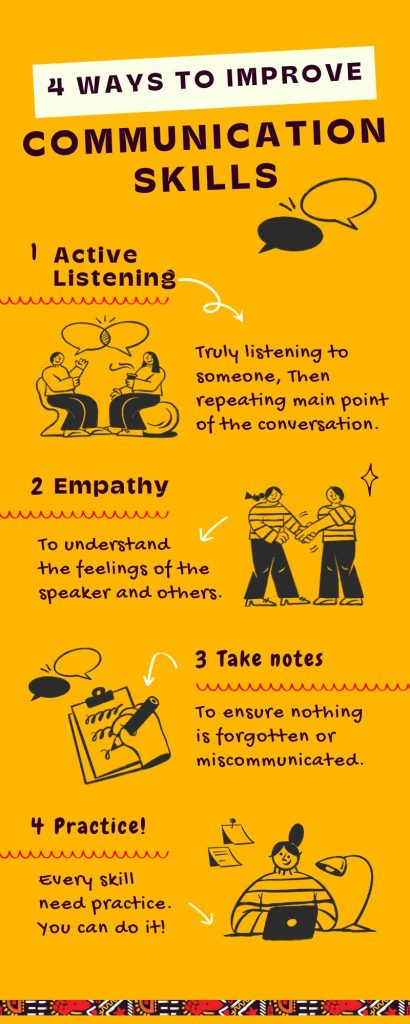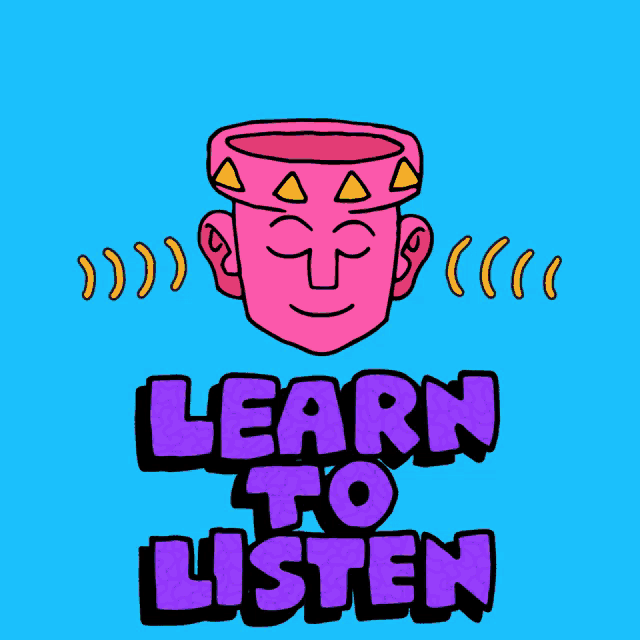Ever heard the saying, ‘’The biggest problem in communication is the illusion that it has taken place’’? It’s one of those statements that really makes you stop and think, especially in today’s world where effective communication is absolutely vital for success. Being able to effectively express yourself is a skill that can come in handy both in your personal and professional life but let’s face it, it’s not always easy. But don’t worry though, we’re here to help.
So what exactly are communication Skills?
These are tools we use to express ourselves clearly. They help us share our ideas and thoughts in a way that other people can easily understand. Communication skills are part of our day-to-day lives. They include active listening, confidence, respect, empathy and clarity. These are the backbone of professional communication. Communication skills help us understand the differences in how to communicate through emails, face-to-face conversations or even phone conversations.
Why are communication skills important?
Glad you asked! They help us navigate the corporate world more smoothly. Honing your communication skills is crucial in the workplace. They help in:
Improving Collaboration: Strengthening your communication abilities enhances your ability to work with your colleagues more effectively. It enables you to seamlessly work together, regardless of whether you’re in the same room or halfway across the world from each other. This makes cooperation easier for everyone involved, leading to more successful outcomes.
Minimizing Conflicts: Clear and effective communication helps to avoid misunderstandings and conflicts with colleagues. Being able to address any issues directly creates an environment where people feel free to share any challenges. Finding solutions together creates a supportive workplace culture where everyone feels valued and respected.
Enhancing Impact: Strong communicators make effective leaders. Being able to articulate your ideas with clarity and conviction, helps inspire and guide your team towards shared goals and objectives. Good communication skills make it easier for them to buy into your vision. This not only boosts morale but also drives success and innovation within the organization.
Increasing Career opportunities: Whether you’re interested in exploring different career paths or simply looking to increase your chances of success with moving up the corporate ladder, strong communication skills can set you apart from the competition. Being able to confidently present your ideas with clarity helps increase your visibility. It makes it easier for your contributions to be valued and recognized which opens doors to new opportunities.
Building Lasting Relationships: In today’s interconnected world, building and maintaining relationships is key to success. Effective communication helps you connect with colleagues, clients, and stakeholders on a deeper level, fostering trust and loyalty that can last a lifetime.
Tips to Improve Your Communication Skills at the Workplace.

Now we’ve covered the importance of communication skills, let’s explore some practical tips for sharpening them.
- Body language matters: Communication isn’t just words; it’s the whole package. Maintain good posture, make eye contact and use natural gestures to emphasize your points. Avoid fidgeting, crossing your arms or looking distracted. Imagine delivering a presentation – confident posture, open smile and engaging eye contact can make all the difference.
- Be Clear and Concise: When sharing information, avoid complex jargon and strive for clarity. Ensure your message is easily understood by your audience, regardless of their background. And try not to over-explain things. You might lose your audience somewhere in the middle.. Remember, less is often more when it comes to impactful communication.
- Embrace Feedback: We all have Blind spots. Don’t shy away from asking others for their opinions. Think of it as an opportunity for growth. Be open to feedback on your communication style. Constructive criticism can help you take your communication skills to the next level by identifying areas for improvement.
- Tailor Your Communication Style: In this case, one size doesn’t fit all! Adapt your communication approach based on your audience and the context. For example, use a formal tone in presentations, a more relaxed style in brainstorming sessions. Adjust your communication channels (email, video calls, instant messaging) according to the audience. For instance, using emails or phone calls when reaching out to potential clients.
- Develop Empathy: Put yourself in others’ shoes. Consider their perspectives and feelings when communicating. This helps build trust and understanding as people are more likely to engage with you if they feel you provide a safe space for them to share their views. Your message will also have higher chances of resonating with them.
- Practice Active Listening: Communication is a two-way street. Resist the urge to interrupt or come up with a response. Focus on truly understanding what others are saying, rather than just waiting for your turn to speak. Imagine a colleague venting about a project. Ask clarifying questions, acknowledge their perspective and pay attention to nonverbal cues like posture and tone. When you truly listen, you build trust, gain valuable insights and avoid misunderstandings.

7. Adopt Technology, But Use It Wisely: Leverage technology to enhance your communication. Project management platforms like Asana and Slack streamline collaboration. Video conferencing tools like Zoom and Google Meets bridge geographical gaps while instant messaging facilitates quick exchanges. However, keep in mind digital etiquette: proper grammar, respectful language and mindful use of time are crucial for maintaining professionalism online.
Bonus Tip: Practice, Practice and more Practice: Like any skill, communication improves the more you put what you’re learning into practice . It may seem scary but don’t be afraid to step outside your comfort zone and experiment with different communication techniques. It doesn’t have to be a chore. You can start by recording yourself as you practice your skills before building up to volunteering for presentations. The more you make use of your skills, the easier it gets and the more confident and effective you’ll become.
In conclusion, mastering communication skills is a continuous process which plays a key role in your journey to personal and professional growth. Instead of thinking of it as a quick trip, think of it as a scenic journey and enjoy the ride. It’s important to be patient with yourself. Learning is a process. Look for more opportunities to grow and improve your skills. By incorporating these tips into your daily interactions you can elevate your communication and contribute to a more collaborative workplace.
Would you like to try it out but you’re not sure where to start? Don’t worry, we’ve got your back. Explore our courses, designed to empower professionals like you, with the tools to excel in the workplace.
Take the first step toward becoming a communication champion and unlock a world of opportunities!